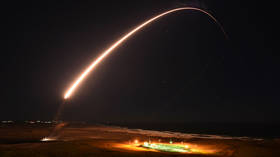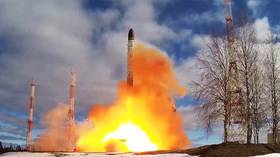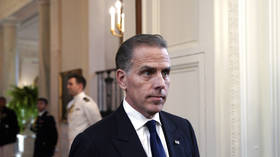US Air Force fires top missile program manager

The US Air Force has sacked the official responsible for developing its next-generation ‘Sentinel’ intercontinental ballistic missile. The rocket is earmarked to replace the 1970s-era Minuteman III as the land-based element of Washington’s nuclear triad.
Earlier this year, Congress launched a review of the program after its costs ballooned by at least 37% to an estimated $131 billion. In its report on the Defense Department’s fiscal 2025 budget request, the House Appropriations Committee said it “was stunned to learn” of the massive increase in costs.
The lawmakers eventually agreed to earmark $3.4 billion for the program in the coming year, $340 million less than requested.
According to a statement by the US Air Force, quoted by several media outlets, Colonel Charles Clegg was ousted as director of the Sentinel Systems project on Monday “because he did not follow organizational procedures.” A spokesperson for the Air Force cited a “loss of confidence,” but denied that the dismissal had been “directly related” to the ongoing congressional review.
In January, Bloomberg reported that a 1982 law had mandated the scrutiny after the project overspent its budget by more than a third over the course of two years.
Now, the Pentagon and Joint Chiefs of Staff are having to justify the cost overruns and present convincing arguments to lawmakers. The lion’s share of the sum is apparently needed to upgrade existing launch sites and communications lines.
This task, estimated to last nearly ten years, will be a lengthy and complicated endeavor "involving real estate purchases, construction, deconstruction, removal and installation of equipment and nuclear certification,” the Senate Armed Services Committee said in its fiscal 2024 budget report.
Earlier this month, Pranay Vaddi, special assistant to the president and senior director for arms control, disarmament, and nonproliferation at the National Security Council, revealed that President Joe Biden had “recently issued updated nuclear weapons employment guidance, which takes into account the realities of a new nuclear era.”
“It emphasizes the need to account for the growth and diversity of [China’s] nuclear arsenal – and the need to deter Russia, [China], and North Korea simultaneously,” the official said at the time.














